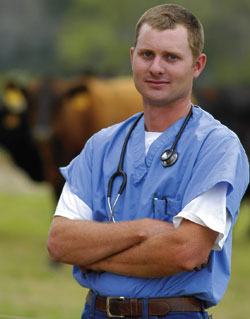Investing in Agriculture’s Future

In Montgomery County, veterinarian Will Carter climbs into a dusty pickup truck on his way to check cows at a nearby beef cattle farm. At the other end of the state, Eric Hoge is completing his coursework at Snead State Community College in Marshall County before transferring to Auburn University in the fall.Although more than six years and 200 miles separate the two young men, they share a common bond. Both are pursing rewarding jobs in agriculture thanks to scholarships from their respective county Farmers Federations.”I’d like to think I would have gone to college and become a vet anyway, but I can’t say for sure,” said Carter, as he swallowed a candy-bar lunch between farm visits. “The (Montgomery County) Farmers Federation means a lot to me. It’s nice to know you have the support of the people you want to help.”Carter, 26, was the first student to receive a Montgomery County Farmers Federation scholarship, said Jane Russell, who chairs the county’s scholarship committee. Today, the farm organization awards $25,000 in scholarships each year. During the past eight years, the group has helped more than 80 students realize their dreams of earning college degrees.”Our county felt like the best way to promote agriculture in our county was to support our young people who wanted to get a degree in agriculture,” Russell said. “We felt like the scholarship program was a wonderful way for us to give back to the community.”Stanley Sumners, who chairs the scholarship committee for the Marshall County Farmers Federation, said the scholarship program helps expose young people to the diverse career opportunities available in agriculture.”We’re trying to get across to the kids that there is more to agriculture than getting out there on a tractor and raising a crop,” Sumners said. “We are trying to get more students involved in the technological side of agriculture. Hopefully, they will come back and help us right here in the county.”Although Hoge has at least two more years of school before he completes his degree in biosystems engineering, Sumners said past scholarship recipients already are making contributions to the farm community in Marshall County. “The ag teacher at Douglas High School, Kevin Williams, went through the program,” Sumners said. “Jamie Brothers also went through the program, and now he works with First South Production Credit here in the county.”Sumners said the Marshall County scholarship program started 12-15 years ago when the Federation board of directors decided to award a full-tuition scholarship to an agricultural science student at Snead State Community College. “We did that for three or four years, and it got to where we could afford to continue the program on into Auburn (University),” Sumners said. “It ended up that, at certain times, we have four kids on scholarships each year.”Hoge, who is a 2002 graduate of Kate Duncan Smith DAR School in Grant, Ala., was awarded a full-tuition scholarship to Auburn University earlier this year. He will be allowed to renew the scholarship for his senior year, provided he remains in an agriculture-related major and makes good grades. Sumners said students (or their parents) must be members of the Alabama Farmers Federation in order to receive scholarships.Carter, who practices large animal medicine in Montgomery, Butler, Crenshaw, Elmore, Lowndes and Pike counties, said the Montgomery County Farmers Federation kept him on scholarship from the time he entered Auburn University as a freshman until he graduated from vet school. As a result, he wasn’t saddled with a huge debt when he started his practice.”Most of the people that graduated with me who had loans owed $100,000 to $120,000,” Carter said. “I was fortunate that–with family support, me pitching in and the Farmers Federation scholarship–I didn’t have any debt when I graduated. That’s one reason I was able to start my own practice. I didn’t have to work to pay off my debts.”Although most of Carter’s classmates specialized in small animal medicine, he was drawn back to large animal medicine by a love of agriculture that outweighed any monetary benefits he might have received from working with cats and dogs.”I wanted to come back and work with the people I respected most,” Carter said. “The farmers, and especially the beef cattle people, always had a special place in my heart.”At least 33 county Farmers Federations have scholarship programs. The Alabama Farmers Federation also awards several state scholarships each year to students majoring in agriculture- and forestry-related fields at Auburn University. In most cases, the recipients are selected by the college or university with input from the county Farmers Federation board of directors or scholarship committee.
